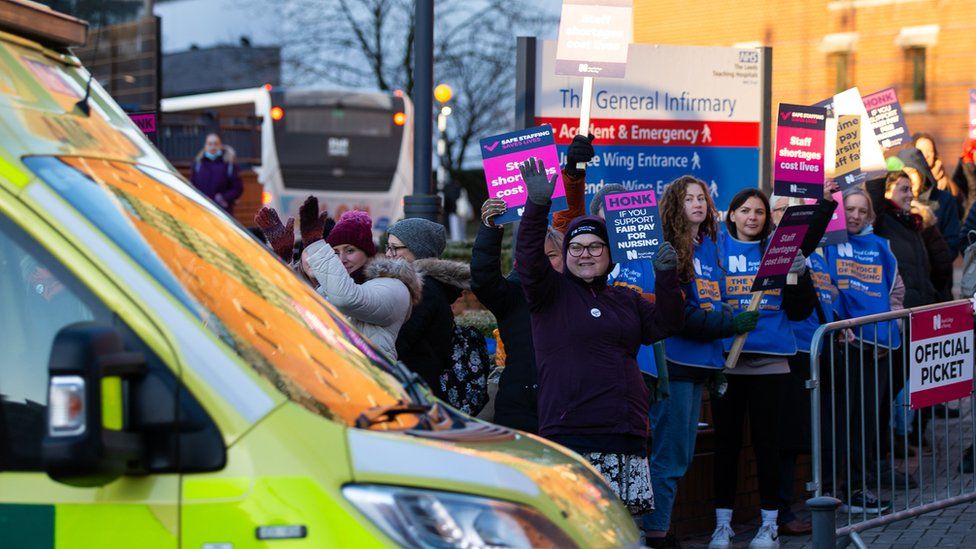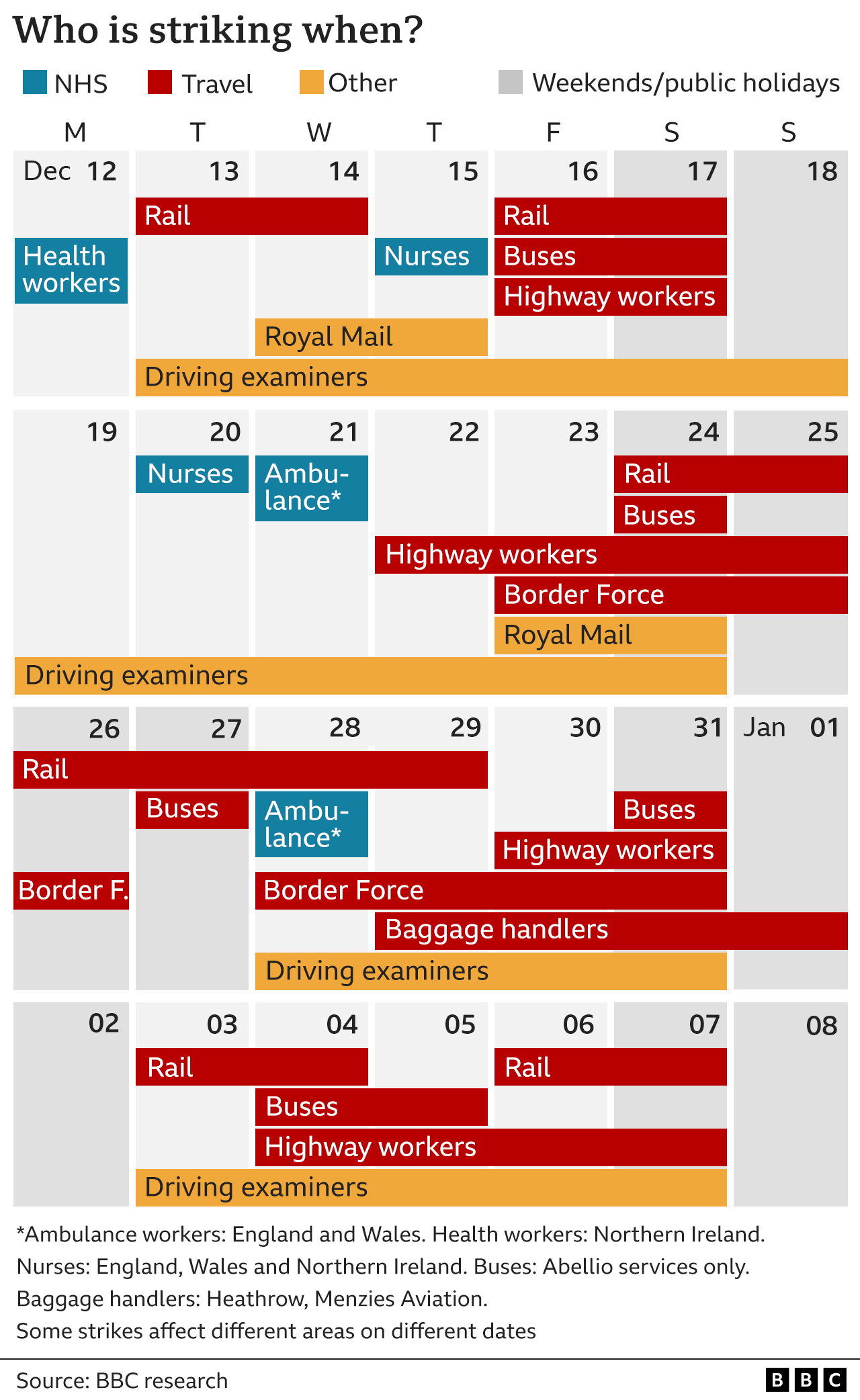Plans for military personnel to keep front-line services running are in place, the government says.
 Image source, Getty Images
Image source, Getty ImagesAbout 1,200 members of the military are to cover for striking ambulance drivers and Border Force staff over Christmas, the government has confirmed.
Ministers say the personnel will plug staffing gaps and keep front-line services running.
Some 10,000 ambulance staff in England and Wales will strike on 21 and 28 December in a pay dispute.
Unions say military staff are not “sufficiently trained” to maintain front line services.
But Health Secretary Steve Barclay said his “number one priority” is keeping patients safe.
The ambulance strikes will affect non-life threatening calls only. However, hospitals have been warned by NHS bosses to prepare for “extensive disruption” during the walkouts, and to free up beds to make it easier to move people through A&E and get paramedics quickly back on the road.
The health service will put into place “tried and tested” plans to reduced risks to patient safety and disruption, the government said, while individual NHS trusts will work with unions to agree on a safe level of cover.
The main union representing Border Force staff is currently set to walk out for eight days between 23 and 31 December, with significant disruption for people travelling over Christmas expected.
They are the latest group of workers to take industrial action this winter – joining nurses, rail workers, Royal Mail staff and others, as industrial action over pay disputes and the rising cost of living have ramped up in recent weeks.
Troops from the Army, Navy and RAF will be deployed. Some 600 members of the armed forces are due to take on ambulance driving roles while 150 personnel will provide logistical support. Community first responders will also be used to help manage demand for medical care.
The co-ordinated walkout was called by the three main ambulance unions – Unison, GMB and Unite.
All three are taking action on 21 December. GMB union members will go on strike again on 28 December.
Mr Barclay described the decision to go ahead with strikes as “deeply regrettable”, repeating the government’s position that the striking unions’ demands are “not affordable” – but he also said that he was “open to further discussions”.
“My number one priority is to keep patients as safe as possible and we are stepping up preparations across government and the NHS, including making best use of the armed forces, volunteers and freeing up capacity to mitigate disruption and ensure safe staffing levels,” he added.
Unite accused ministers of “hollowing out” the health service, describing those taking strike action as “trying to save” the NHS.
GMB and Unison blamed ministers for opting to “dig in their heels” on pay while the NHS is “already on its knees”, adding that disruption now appears “inevitable”.
Sara Gorton, Unison’s head of health, also warned the military is “no substitute” for trained ambulance drivers, adding: “The hours spent on contingency planning could have been better used trying to prevent the strikes from taking place.”

Image source, ADAM VAUGHAN/EPA-EFE/REX/Shutterstock
The strikes comes after nurses carried out their own walkouts on Thursday in parts of England, Wales and Northern Ireland.
Royal College of Nursing (RCN) members are expected to walk out for a second time on 20 December.
The nursing union has said it will set a deadline of 48 hours after this strike ends for ministers to agree to discuss pay – otherwise more extensive action will be announced for the New Year.
The government said pay rises for ambulance workers and nurses were decided by independent pay review bodies – which have recommended pay rises of around 4.75%.
However, with inflation – the annual rate at which prices rise – running at over 10% and many struggling with the rising cost of living, unions have said this represents an unaffordable real terms pay cut.
More than 1,000 civil servants will also join the military personnel to cover for striking Border Force staff, helping “minimise disruption for passengers” by checking documents and passports, the government has said.
Members of the Public and Commercial Services (PCS) union are set walk out on eight days between 23 December and New Year’s Eve.
Around 1,000 Border Force staff who work in passport control will walk out on 23-26 and 28-31 December at Birmingham, Cardiff, Glasgow, Gatwick, Heathrow and Manchester airports as well as at the Port of Newhaven.
About 75% of Border Force staff are members of the PCS union, which balloted for strike action after it said the government had refused to increase a 2% pay rise offer.
As a result, some airlines have stopped selling new tickets for inbound flights to Heathrow on the days Border Force staff strike over Christmas, the BBC understands.
In an effort to to better manage the flow of people through border control, the government has asked airports who are expecting passenger numbers on strike days to be above 70-80% of 2019 levels.
The Home Office has previously said it was “extremely disappointed” with the PCS union’s decision, warning it would cause a “significant inconvenience” to travellers over Christmas and “passengers should be prepared for disruption and take action to plan ahead”.
The PCS has accused Home Secretary Suella Braverman of “scrambling around” to get “anyone she can” to cover for border staff, as well as echoing the ambulance unions’ concern that military staff and other civil servants are not “sufficiently trained”.
The government has also announced it will publish a new “resilience framework” on Monday, aimed at improving how the UK prepares for and responds to critical issues like strikes.
The framework will “bring together all levels of government, critical national infrastructure operators, the private sector, charities and the public to bolster our national preparedness to these risks”, the Cabinet Office said.
